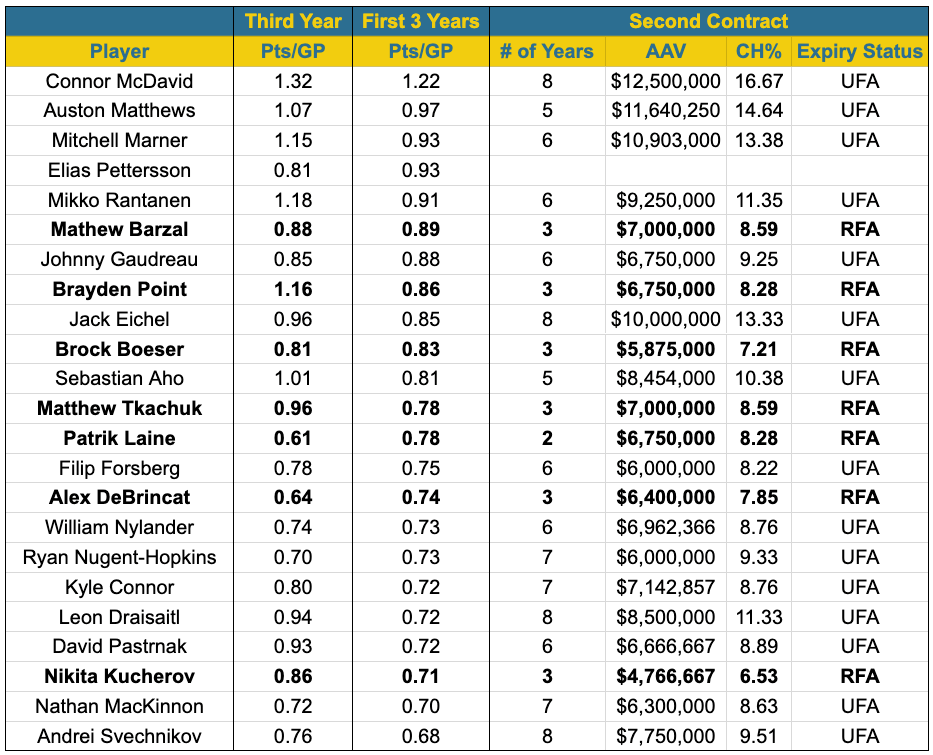It’s less than a month away from the start of the Vancouver Canucks’ training camp and Elias Pettersson and Quinn Hughes still haven’t signed new contracts.
On the one hand, this is unsurprising. Past negotiations with key members of the Canucks’ core have gone right up to training camp, so it’s no surprise that negotiations with Pettersson and Hughes are taking a similar amount of time.
Still, it’s a little nerve-wracking for Canucks fans, particularly when they see other star restricted free agents signing new contracts. Such as, for example, Andrei Svechnikov of the Carolina Hurricanes.
Svechnikov signed long term with the Hurricanes, inking an 8-year deal with an average annual value of $7.75 million. That’s a hefty raise from his entry-level contract and buys up four years where Svechnikov could have potentially become an unrestricted free agent. The hope is that Svechnikov continues to improve and makes that deal look like a bargain in the coming years.
Elias Pettersson is a tier above Andrei Svechnikov
The Svechnikov deal had some Canucks fans thinking that could set the market for Pettersson but the two players just aren’t in the same league.
Well, literally they are in the same league. Figuratively speaking, however, they’re not.
Pettersson has scored at a rate of 0.93 points per game so far in his career, while Svechnikov has scored at a rate of 0.68 points per game. To be fair, Svechnikov is younger and started his NHL career at 18, while Pettersson started at 20, but even if you drop that rookie year from the calculation, Svechnikov comes out to 0.84 points per game, still short of Pettersson.
Hoping that Pettersson might sign a similar deal to Svechnikov is optimistic. Even hoping that Pettersson would sign long-term for a little bit north of Svechnikov’s $7.75 million is unrealistic.
Instead of Svechnikov, a closer comparable to Elias Pettersson is Jack Eichel.
Eichel and Pettersson are surprisingly similar
That might seem outrageous, but it’s honestly not that outlandish a comparison. It wouldn’t be surprising if it’s a comparison that Pettersson’s camp has already made in contract negotiations.
There is the obvious parallel of both being franchise centres for a rebuilding team, but the more stark comparison comes when we look at their points.
In the first three years of Eichel’s career, he put up 0.85 points per game — less than Pettersson’s 0.93 — but he spend his 19-year-old season in the NHL, while Pettersson was in Sweden, dominating the SHL. If we instead directly compare the two players at 20 and 21 years old, they’re nearly indistinguishable.
 Elias Pettersson vs Jack Eichel
Elias Pettersson vs Jack EichelAt 20, Pettersson put up 66 points in 71 games as a rookie, an identical 0.93 points per game as Eichel at the same age.
At 21, Pettersson and Eichel each had 39 assists, while Pettersson managed two more goals than Eichel in one more game. That gave Pettersson the edge in points per game, 0.97 to 0.96.
Certainly, Pettersson’s Canucks were a higher scoring team than Eichel’s Buffalo Sabres, but it’s not like Eichel had no offensive help — he had Ryan O’Reilly, Sam Reinhart, and Evander Kane for both of those seasons.
Eichel’s second contract was massive, an 8-year deal with an average annual value of $10 million. That’s a lot more than Svechnikov’s $7.75 million and it’s an even bigger difference when you look at cap hit percentage instead of raw dollars.
Eichel’s contract took up 13.33% of the Sabres’ salary cap at the time it was signed compared to 9.51% for Svechnikov’s contract. At the current salary cap of $81.5 million, an equivalent cap hit to Eichel’s would be approximately $10.86 million.
If that sounds like a lot, consider another Pettersson comparable — Mitch Marner of the Toronto Maple Leafs. In his first three years in the NHL, Marner averaged 0.93 points per game, identical to Pettersson. Marner’s second contract was a 6-year deal with an average annual value of $10.9 million.
The one major difference is that Marner had a better contract year than Pettersson, who suffered a season-ending injury after a relatively slow start exacerbated by hitting a near-historic number of posts and crossbars.
Who are Petterrsson's comparables for bridge deals?
High-priced comparables like Eichel and Marner, combined with the Canucks’ limited cap space, are part of why it’s unlikely that Pettersson signs a long-term deal that eats up years where he could become an unrestricted free agent. Instead, he’s more likely to sign a short-term deal where he remains a restricted free agent when it expires, known as a bridge contract.
A bridge contract means a much lower cap hit, with the tacit understanding that if a player excels they’ll be able to sign for a lot more money on their third contract. The other possibility is that a player could sign another short-term contract after their bridge deal and thereby get to unrestricted free agency much sooner.
For a bridge deal, the key comparable for Pettersson is Mathew Barzal, who had 0.89 points per game through his first three season, just a little under Pettersson’s 0.93, though he also was better than a point per game in his rookie season.
Barzal signed a three-year deal worth $7 million per year on his second contract, so that’s a likely starting point for Pettersson.
In other words, Pettersson could come close to Svechnikov’s $7.75 million cap hit on a short-term bridge contract instead of a max-term 8-year deal.
I put together a list of other potential comparables to Pettersson, highlighting the players who signed bridge contracts. I ranked them by points per game through the three seasons of their entry-level contracts and included Svechnikov at the bottom, so you can see where he falls in comparison.
 Elias Pettersson's contract comparables
Elias Pettersson's contract comparablesYou can see how well Pettersson compares to some of the best players in the NHL — very well indeed. If not for Pettersson’s slow start in his contract year, he’d be even higher — only Connor McDavid had a higher points-per-game than Pettersson through their first two seasons.
The bridge contracts closest to Pettersson fall in that same 8.28-8.59% of the salary cap, though Pettersson notably scored at a higher rate in his first three seasons than any of those comparable players.
Brock Boeser’s bridge contract, meanwhile, looks fantastic in comparison to those around him, though it notably came with a poison pill — a $7.5 million salary in the final year that ensures his next qualifying offer has to be $7.5 million. Still, with similar players getting just under $7 million per year on their bridge contracts, Boeser’s deal looks pretty great.
Don't expect a MacKinnon-style "discount" for Pettersson
It has been suggested to me by some Canucks fans that Pettersson should be like Nathan MacKinnon and sign a long-term deal at a discount in order to give the Canucks the cap space to build a contender. When you look at MacKinnon’s body of work when he signed his second contract, however, there’s no comparison.
MacKinnon wasn’t in the conversation as one of the best players in the league after three seasons like he is now. Instead, he averaged 0.70 points per game through his first three seasons with a career high of 24 goals and 63 points. He was closer to players like Filip Forsberg, William Nylander, or Kyle Connor and signed an equivalent contract.
In other words, MacKinnon didn’t really take a discount on that contract. He signed at about market value. It’s only after he signed that contract that he exploded and became a true franchise player.
Expecting Pettersson, who has already shown that he can be a franchise forward, to take a similar contract just doesn’t make sense.
What’s more likely is that Pettersson signs a three-year deal worth around $7.5 million per year.
That fits with industry consensus. When The Athletic polled five player agents on Pettersson's next contract, they predicted a cap hit between $7.2 to $8 million on a bridge contract, averaging out at $7.53 million.

.JPG;w=120;h=80;mode=crop)


